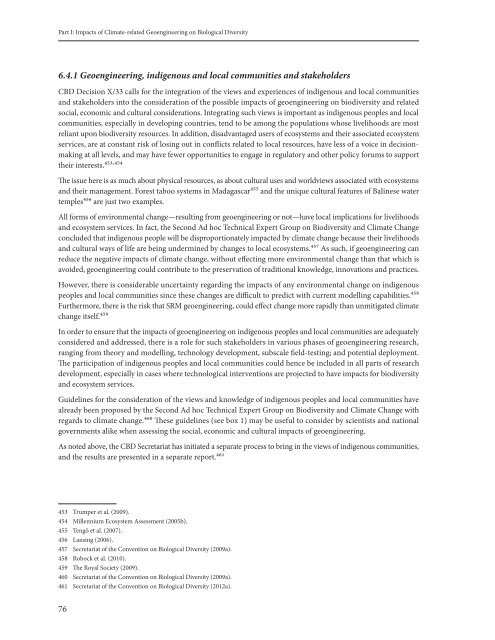cbd-ts-66-en
cbd-ts-66-en
cbd-ts-66-en
Create successful ePaper yourself
Turn your PDF publications into a flip-book with our unique Google optimized e-Paper software.
Part I: Impac<strong>ts</strong> of Climate-related Geo<strong>en</strong>gineering on Biological Diversity<br />
6.4.1 Geo<strong>en</strong>gineering, indig<strong>en</strong>ous and local communities and stakeholders<br />
CBD Decision X/33 calls for the integration of the views and experi<strong>en</strong>ces of indig<strong>en</strong>ous and local communities<br />
and stakeholders into the consideration of the possible impac<strong>ts</strong> of geo<strong>en</strong>gineering on biodiversity and related<br />
social, economic and cultural considerations. Integrating such views is important as indig<strong>en</strong>ous peoples and local<br />
communities, especially in developing countries, t<strong>en</strong>d to be among the populations whose livelihoods are most<br />
reliant upon biodiversity resources. In addition, disadvantaged users of ecosystems and their associated ecosystem<br />
services, are at constant risk of losing out in conflic<strong>ts</strong> related to local resources, have less of a voice in decisionmaking<br />
at all levels, and may have fewer opportunities to <strong>en</strong>gage in regulatory and other policy forums to support<br />
their interes<strong>ts</strong>.453, 454<br />
The issue here is as much about physical resources, as about cultural uses and worldviews associated with ecosystems<br />
and their managem<strong>en</strong>t. Forest taboo systems in Madagascar455 and the unique cultural features of Balinese water<br />
temples456 are just two examples.<br />
All forms of <strong>en</strong>vironm<strong>en</strong>tal change—resulting from geo<strong>en</strong>gineering or not—have local implications for livelihoods<br />
and ecosystem services. In fact, the Second Ad hoc Technical Expert Group on Biodiversity and Climate Change<br />
concluded that indig<strong>en</strong>ous people will be disproportionately impacted by climate change because their livelihoods<br />
and cultural ways of life are being undermined by changes to local ecosystems.457 As such, if geo<strong>en</strong>gineering can<br />
reduce the negative impac<strong>ts</strong> of climate change, without effecting more <strong>en</strong>vironm<strong>en</strong>tal change than that which is<br />
avoided, geo<strong>en</strong>gineering could contribute to the preservation of traditional knowledge, innovations and practices.<br />
However, there is considerable uncertainty regarding the impac<strong>ts</strong> of any <strong>en</strong>vironm<strong>en</strong>tal change on indig<strong>en</strong>ous<br />
peoples and local communities since these changes are difficult to predict with curr<strong>en</strong>t modelling capabilities.458<br />
Furthermore, there is the risk that SRM geo<strong>en</strong>gineering, could effect change more rapidly than unmitigated climate<br />
change i<strong>ts</strong>elf.459<br />
In order to <strong>en</strong>sure that the impac<strong>ts</strong> of geo<strong>en</strong>gineering on indig<strong>en</strong>ous peoples and local communities are adequately<br />
considered and addressed, there is a role for such stakeholders in various phases of geo<strong>en</strong>gineering research,<br />
ranging from theory and modelling, technology developm<strong>en</strong>t, subscale field-testing; and pot<strong>en</strong>tial deploym<strong>en</strong>t.<br />
The participation of indig<strong>en</strong>ous peoples and local communities could h<strong>en</strong>ce be included in all par<strong>ts</strong> of research<br />
developm<strong>en</strong>t, especially in cases where technological interv<strong>en</strong>tions are projected to have impac<strong>ts</strong> for biodiversity<br />
and ecosystem services.<br />
Guidelines for the consideration of the views and knowledge of indig<strong>en</strong>ous peoples and local communities have<br />
already be<strong>en</strong> proposed by the Second Ad hoc Technical Expert Group on Biodiversity and Climate Change with<br />
regards to climate change.460 These guidelines (see box 1) may be useful to consider by sci<strong>en</strong>tis<strong>ts</strong> and national<br />
governm<strong>en</strong><strong>ts</strong> alike wh<strong>en</strong> assessing the social, economic and cultural impac<strong>ts</strong> of geo<strong>en</strong>gineering.<br />
As noted above, the CBD Secretariat has initiated a separate process to bring in the views of indig<strong>en</strong>ous communities,<br />
and the resul<strong>ts</strong> are pres<strong>en</strong>ted in a separate report.461<br />
453 Trumper et al. (2009).<br />
454 Mill<strong>en</strong>nium Ecosystem Assessm<strong>en</strong>t (2005b).<br />
455 T<strong>en</strong>gö et al. (2007).<br />
456 Lansing (2006).<br />
457 Secretariat of the Conv<strong>en</strong>tion on Biological Diversity (2009a).<br />
458 Robock et al. (2010).<br />
459 The Royal Society (2009).<br />
460 Secretariat of the Conv<strong>en</strong>tion on Biological Diversity (2009a).<br />
461 Secretariat of the Conv<strong>en</strong>tion on Biological Diversity (2012a).<br />
76


